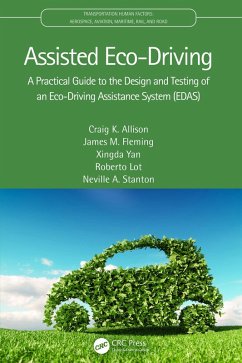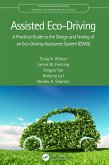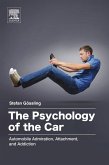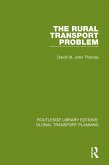Craig K. Allison, James M. Fleming, Xingda Yan, Roberto Lot, Neville A. Stanton
Assisted Eco-Driving (eBook, ePUB)
A Practical Guide to the Design and Testing of an Eco-Driving Assistance System (EDAS)
51,95 €
51,95 €
inkl. MwSt.
Sofort per Download lieferbar

26 °P sammeln
51,95 €
Als Download kaufen

51,95 €
inkl. MwSt.
Sofort per Download lieferbar

26 °P sammeln
Jetzt verschenken
Alle Infos zum eBook verschenken
51,95 €
inkl. MwSt.
Sofort per Download lieferbar
Alle Infos zum eBook verschenken

26 °P sammeln
Craig K. Allison, James M. Fleming, Xingda Yan, Roberto Lot, Neville A. Stanton
Assisted Eco-Driving (eBook, ePUB)
A Practical Guide to the Design and Testing of an Eco-Driving Assistance System (EDAS)
- Format: ePub
- Merkliste
- Auf die Merkliste
- Bewerten Bewerten
- Teilen
- Produkt teilen
- Produkterinnerung
- Produkterinnerung

Bitte loggen Sie sich zunächst in Ihr Kundenkonto ein oder registrieren Sie sich bei
bücher.de, um das eBook-Abo tolino select nutzen zu können.
Hier können Sie sich einloggen
Hier können Sie sich einloggen
Sie sind bereits eingeloggt. Klicken Sie auf 2. tolino select Abo, um fortzufahren.

Bitte loggen Sie sich zunächst in Ihr Kundenkonto ein oder registrieren Sie sich bei bücher.de, um das eBook-Abo tolino select nutzen zu können.
This book discusses an integrative approach combining Human Factors expertise with Automotive Engineering. It develops an in-depth case study of designing a fuel-efficient driving intervention and offers an examination of an innovative study of feed-forward eco-driving advice.
- Geräte: eReader
- ohne Kopierschutz
- eBook Hilfe
- Größe: 6.77MB
Andere Kunden interessierten sich auch für
![Assisted Eco-Driving (eBook, PDF) Assisted Eco-Driving (eBook, PDF)]() Craig K. AllisonAssisted Eco-Driving (eBook, PDF)51,95 €
Craig K. AllisonAssisted Eco-Driving (eBook, PDF)51,95 €![The Psychology of the Car (eBook, ePUB) The Psychology of the Car (eBook, ePUB)]() Stefan GosslingThe Psychology of the Car (eBook, ePUB)61,95 €
Stefan GosslingThe Psychology of the Car (eBook, ePUB)61,95 €![The Rural Transport Problem (eBook, ePUB) The Rural Transport Problem (eBook, ePUB)]() David St John ThomasThe Rural Transport Problem (eBook, ePUB)23,95 €
David St John ThomasThe Rural Transport Problem (eBook, ePUB)23,95 €![Car Ownership Forecasting (eBook, ePUB) Car Ownership Forecasting (eBook, ePUB)]() E. W. AllansonCar Ownership Forecasting (eBook, ePUB)23,95 €
E. W. AllansonCar Ownership Forecasting (eBook, ePUB)23,95 €![Driving the Future (eBook, ePUB) Driving the Future (eBook, ePUB)]() Margo T. OgeDriving the Future (eBook, ePUB)12,85 €
Margo T. OgeDriving the Future (eBook, ePUB)12,85 €![Driving the Future (eBook, ePUB) Driving the Future (eBook, ePUB)]() Margo T. OgeDriving the Future (eBook, ePUB)12,85 €
Margo T. OgeDriving the Future (eBook, ePUB)12,85 €![Transportation Networks (eBook, ePUB) Transportation Networks (eBook, ePUB)]() D. TeodorovicTransportation Networks (eBook, ePUB)29,95 €
D. TeodorovicTransportation Networks (eBook, ePUB)29,95 €-
-
-
This book discusses an integrative approach combining Human Factors expertise with Automotive Engineering. It develops an in-depth case study of designing a fuel-efficient driving intervention and offers an examination of an innovative study of feed-forward eco-driving advice.
Dieser Download kann aus rechtlichen Gründen nur mit Rechnungsadresse in A, B, BG, CY, CZ, D, DK, EW, E, FIN, F, GR, HR, H, IRL, I, LT, L, LR, M, NL, PL, P, R, S, SLO, SK ausgeliefert werden.
Produktdetails
- Produktdetails
- Verlag: Taylor & Francis
- Seitenzahl: 266
- Erscheinungstermin: 17. November 2021
- Englisch
- ISBN-13: 9781000473490
- Artikelnr.: 62673235
- Verlag: Taylor & Francis
- Seitenzahl: 266
- Erscheinungstermin: 17. November 2021
- Englisch
- ISBN-13: 9781000473490
- Artikelnr.: 62673235
Dr. Craig K. Allison earned his PhD in Web Science (Psychology) from the University of Southampton in 2016. Craig received his M.Sc in Web Science from the University of Southampton in 2011, and his B.Sc in Psychology in 2009, also from the University of Southampton. Craig's research background originated within spatial psychology, before transitioning to Human Factors research. Craig has worked on numerous topics, primarily related to the aviation and automotive industries. With expertise in both qualitative and quantitative analysis, Craig has extensive experience running research trials and working in multidisciplinary teams. Craig's currently Lecturer in Psychology at Solent University, Southampton.
Dr. James M. Fleming earned the MEng and DPhil degrees in Engineering Science from the University of Oxford in 2012 and 2016 respectively, following which he spent three years as a Research Fellow at the University of Southampton before joining the Wolfson School of Mechanical, Electrical and Manufacturing Engineering at Loughborough University in September 2019. He has research interests in the theory and practice of optimal control and model predictive control, with applications to fuel- and energy- efficient driving, motorcycle stability and renewable energy.
Dr Xingda Yan earned the B.Eng. degree in automation from the Harbin Institute of Technology, Harbin, China, in 2012, and the Ph.D. degree in electrical engineering from the University of Southampton, Southampton, U.K., in 2017. He was a Research Fellow with the Mechanical Engineering Department at the University of Southampton. Xindga is currently an automotive power engineer at Compound Semiconductor Applications Catapult, Newport, UK and a visiting researcher with the Mechatronics Engineering Group, University of Southampton. His research interests include power electronics, hybrid system modelling and control, model predictive control, hybrid electric vehicle modelling, and energy management.
Dr Roberto Lot was Professor of Automotive Engineering at the University of Southampton (UK) from 2014 to August 2019 and has recently moved to the University of Padova (Italy). He earned a PhD in Mechanics of Machines in 1998 and a Master Degree cum laude in Mechanical Engineering in 1994 from the University of Padua (Italy). His research interests include both road and race vehicles, in particular dynamics and control. He has directed several national and international research projects and published more than 100 scientific papers and contributing to make our vehicles safer, faster, and more eco-friendly.
Professor Neville A. Stanton PhD, DSc, is a Chartered Psychologist, Chartered Ergonomist and Chartered Engineer. He holds the chair in Human Factors Engineering in the Faculty of Engineering and the Environment at the University of Southampton in the UK. He has degrees in Occupational Psychology, Applied Psychology and Human Factors Engineering and has worked at the Universities of Aston, Brunel, Cornell and MIT. His research interests include modelling, predicting, analysing and evaluating human performance in systems as well as designing the interfaces and interaction between humans and technology.
Dr. James M. Fleming earned the MEng and DPhil degrees in Engineering Science from the University of Oxford in 2012 and 2016 respectively, following which he spent three years as a Research Fellow at the University of Southampton before joining the Wolfson School of Mechanical, Electrical and Manufacturing Engineering at Loughborough University in September 2019. He has research interests in the theory and practice of optimal control and model predictive control, with applications to fuel- and energy- efficient driving, motorcycle stability and renewable energy.
Dr Xingda Yan earned the B.Eng. degree in automation from the Harbin Institute of Technology, Harbin, China, in 2012, and the Ph.D. degree in electrical engineering from the University of Southampton, Southampton, U.K., in 2017. He was a Research Fellow with the Mechanical Engineering Department at the University of Southampton. Xindga is currently an automotive power engineer at Compound Semiconductor Applications Catapult, Newport, UK and a visiting researcher with the Mechatronics Engineering Group, University of Southampton. His research interests include power electronics, hybrid system modelling and control, model predictive control, hybrid electric vehicle modelling, and energy management.
Dr Roberto Lot was Professor of Automotive Engineering at the University of Southampton (UK) from 2014 to August 2019 and has recently moved to the University of Padova (Italy). He earned a PhD in Mechanics of Machines in 1998 and a Master Degree cum laude in Mechanical Engineering in 1994 from the University of Padua (Italy). His research interests include both road and race vehicles, in particular dynamics and control. He has directed several national and international research projects and published more than 100 scientific papers and contributing to make our vehicles safer, faster, and more eco-friendly.
Professor Neville A. Stanton PhD, DSc, is a Chartered Psychologist, Chartered Ergonomist and Chartered Engineer. He holds the chair in Human Factors Engineering in the Faculty of Engineering and the Environment at the University of Southampton in the UK. He has degrees in Occupational Psychology, Applied Psychology and Human Factors Engineering and has worked at the Universities of Aston, Brunel, Cornell and MIT. His research interests include modelling, predicting, analysing and evaluating human performance in systems as well as designing the interfaces and interaction between humans and technology.
Chapter 1: Eco-driving: Reducing emissions from everyday driving behaviours
Chapter 2: Applying Cognitive Work Analysis to Understand Fuel-Efficient
Driving
Chapter 3: Adaptive driver modelling in eco-driving assistance systems
Chapter 4: Taming Design with Intent using Cognitive Work Analysis
Chapter 5: Applying Design with Intent to support creativity in developing
vehicle fuel efficiency interfaces
Chapter 6: Incorporating driver preferences into eco-driving optimal
controllers
Chapter 7: Receding horizon eco-driving assistance systems for electric
vehicles
Chapter 8: Assessment of a visual interface to reduce fuel use
Chapter 9: Assisted versus unassisted eco-driving for electrified
powertrains
Chapter 10: Predictive eco-driving assistance on the road
Chapter 11: Designing for eco-driving: Guidelines for a more fuel-efficient
vehicle and driver
Chapter 2: Applying Cognitive Work Analysis to Understand Fuel-Efficient
Driving
Chapter 3: Adaptive driver modelling in eco-driving assistance systems
Chapter 4: Taming Design with Intent using Cognitive Work Analysis
Chapter 5: Applying Design with Intent to support creativity in developing
vehicle fuel efficiency interfaces
Chapter 6: Incorporating driver preferences into eco-driving optimal
controllers
Chapter 7: Receding horizon eco-driving assistance systems for electric
vehicles
Chapter 8: Assessment of a visual interface to reduce fuel use
Chapter 9: Assisted versus unassisted eco-driving for electrified
powertrains
Chapter 10: Predictive eco-driving assistance on the road
Chapter 11: Designing for eco-driving: Guidelines for a more fuel-efficient
vehicle and driver
Chapter 1: Eco-driving: Reducing emissions from everyday driving behaviours
Chapter 2: Applying Cognitive Work Analysis to Understand Fuel-Efficient
Driving
Chapter 3: Adaptive driver modelling in eco-driving assistance systems
Chapter 4: Taming Design with Intent using Cognitive Work Analysis
Chapter 5: Applying Design with Intent to support creativity in developing
vehicle fuel efficiency interfaces
Chapter 6: Incorporating driver preferences into eco-driving optimal
controllers
Chapter 7: Receding horizon eco-driving assistance systems for electric
vehicles
Chapter 8: Assessment of a visual interface to reduce fuel use
Chapter 9: Assisted versus unassisted eco-driving for electrified
powertrains
Chapter 10: Predictive eco-driving assistance on the road
Chapter 11: Designing for eco-driving: Guidelines for a more fuel-efficient
vehicle and driver
Chapter 2: Applying Cognitive Work Analysis to Understand Fuel-Efficient
Driving
Chapter 3: Adaptive driver modelling in eco-driving assistance systems
Chapter 4: Taming Design with Intent using Cognitive Work Analysis
Chapter 5: Applying Design with Intent to support creativity in developing
vehicle fuel efficiency interfaces
Chapter 6: Incorporating driver preferences into eco-driving optimal
controllers
Chapter 7: Receding horizon eco-driving assistance systems for electric
vehicles
Chapter 8: Assessment of a visual interface to reduce fuel use
Chapter 9: Assisted versus unassisted eco-driving for electrified
powertrains
Chapter 10: Predictive eco-driving assistance on the road
Chapter 11: Designing for eco-driving: Guidelines for a more fuel-efficient
vehicle and driver







